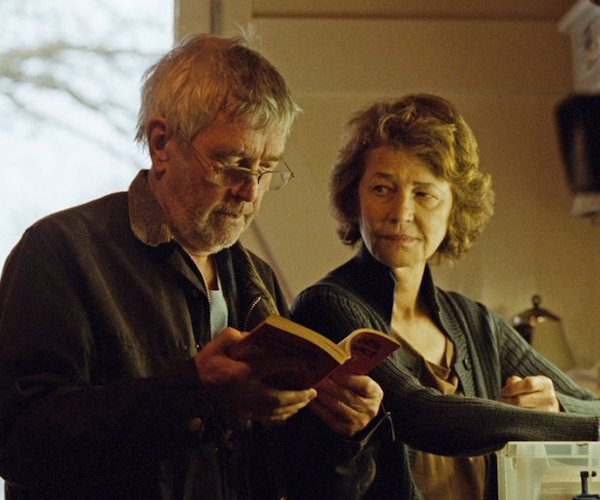Film Review: “45 Years” — The Real Thing
In a period of comic book action dribble and survivalist fantasies, 45 Years shows the world that films can probe reality, with enormous beauty and depth.
45 Years, directed by Andrew Haigh. At Kendall Square Cinema, West Newton Cinema, and Newburyport Screening Room.

A scene featuring Tom Courtney and Charlotte Rampling in “45 Years.”
By Paul Dervis
45 Years is a throwback film, a reminder, at least in spirit, of perhaps the greatest period of English Language cinema, those simple yet powerful movies that came out out of England from the late 1950s to the early 1970s. This period, affectionately known as the British New Wave (with all the “kitchen sink” and “angry young man” connotations), gave the world directors such as Tony Richardson, Karel Reisz, and the incomparable Lindsay Anderson. Films such as Saturday Night and Sunday Morning, This Sporting Life, A Taste of Honey, and The Loneliness of the Long Distance Runner made major stars of their casts. Think Albert Finney, Richard Harris, and Tom Courtenay.
The careers of Finney and Harris are quite well known to the public. They spent their lives acting in films. Courtenay, on the other hand, has plied his trade mostly on the London stage, making only a few well received appearances on celluloid. In 1987 he reprised his role from Ronald Harwood’s The Dresser; he was nominated for an Oscar for his trouble. He was seen in the 2002 film version of Nicholas Nickleby. Other than those, his cinematic appearances have been rare indeed.
Charlotte Rampling, whose career started with bit parts in a couple of Richard Lester films, including the cult classic A Hard Day’s Night and the film version of Ann Jellicoe’s The Knack… and How to Get it, got her star break in Georgy Girl and went on to play the female lead, opposite Dirk Bogarde, in the disturbing and controversial The Night Porter.
In 45 Years, the chemistry between these two actors is tangible. Geoff and Kate Mercer are days away from a big bash that’s being held to celebrate their 45th anniversary. An unusual year to mark, to be sure. But the 40th had to be cancelled because Geoff was suffering from a serious heart condition.
Just five days before the party, Geoff gets a letter from Switzerland. It seems they have found the body of an old girlfriend, frozen in the Alps for more than a half century. They are contacting him because, back in the early sixties, the couple passed themselves off as married so they could stay where they wanted and do what they wanted during a more repressed era.
Kate had heard of this woman, but only in passing, so she was unaware of how significant a relationship it was, and how deeply it would disturb the couple’s lives this coming week.
Geoff, a quiet man in the best of times, becomes both anxious and distant. Unable to sleep, Kate finds him rummaging in the attic in the wee hours, going through old keepsakes. She wants Geoff to open up about his feelings, but he is more inclined to be silent, withholding his emotions.
Finally, she gets him to talk. And he doesn’t know when to stop. He was in love with this young woman, planning to marry her. She was potentially the love of his life.
Kate is devastated. She questions their decades of marriage. Was she only the rebound? Has he been pining away for this girl all the time they have been together?. The closer they get to their anniversary, the more disconcerted Kate becomes. And Geoff appears incapable of assuaging her fears.
This is a quiet, intense film that takes its time unravelling the lives of an aging couple. In the turbulent sixties, Geoff and Kate were radicals. Now, on both sides of seventy, they have settled into a genteel, very British lifestyle…that is, until that lost period in time comes back to haunt them.
Written and directed by Andrew Haigh, from a short story by David Constantine, the filmmaker takes great care to make his story about the exploration of the souls of these characters, patiently scrutinizing their faces and bodies. He has entrusted both Courtenay and Rampling with the task of showing the couple’s mood swings, their doubts, despair, and joys, without falling back on vapid dialogue, and the two actors reward him with award-winning performances. In fact, Rampling has been nominated for an Academy Award for 45 Years and Courtenay should have been. Rampling likely won’t win — that’s not how the Academy works. But when you see DiCaprio walk on stage to receive his statue for gnashing his teeth for two hours in The Revenant, take a moment to think of Rampling in this amazing film.
In a period of comic book action dribble and survivalist fantasies, 45 Years shows the world that films can probe reality, with enormous beauty and depth.
Paul Dervis has been teaching drama in Canada at Algonquin College as well as the theatre conservatory Ottawa School of Speech & Drama for the past 15 years. Previously he ran theatre companies in Boston, New York, and Montreal. He has directed over 150 stage productions, receiving two dozen awards for his work. Paul has also directed six films, the most recent being 2011’s The Righteous Tithe.
